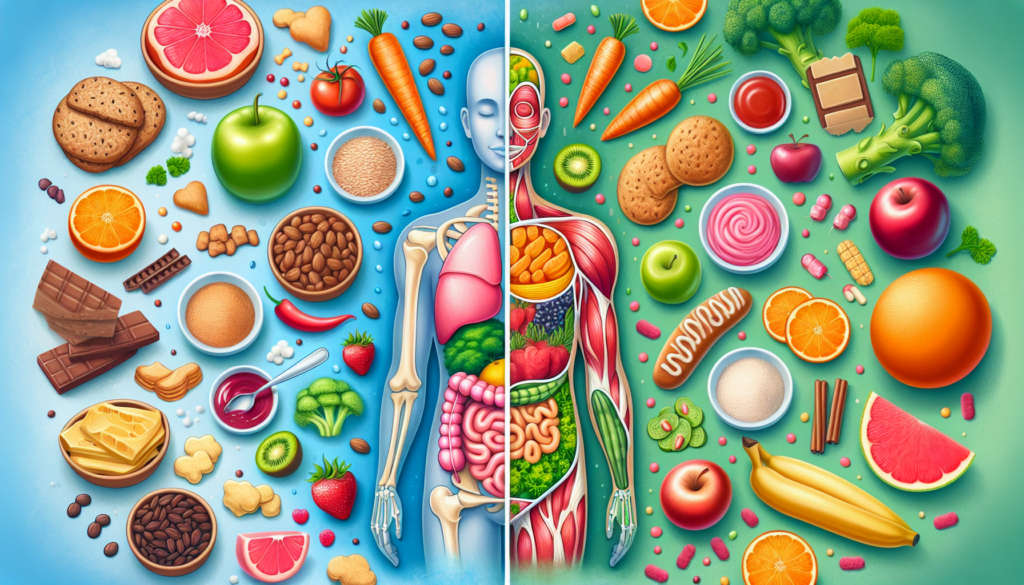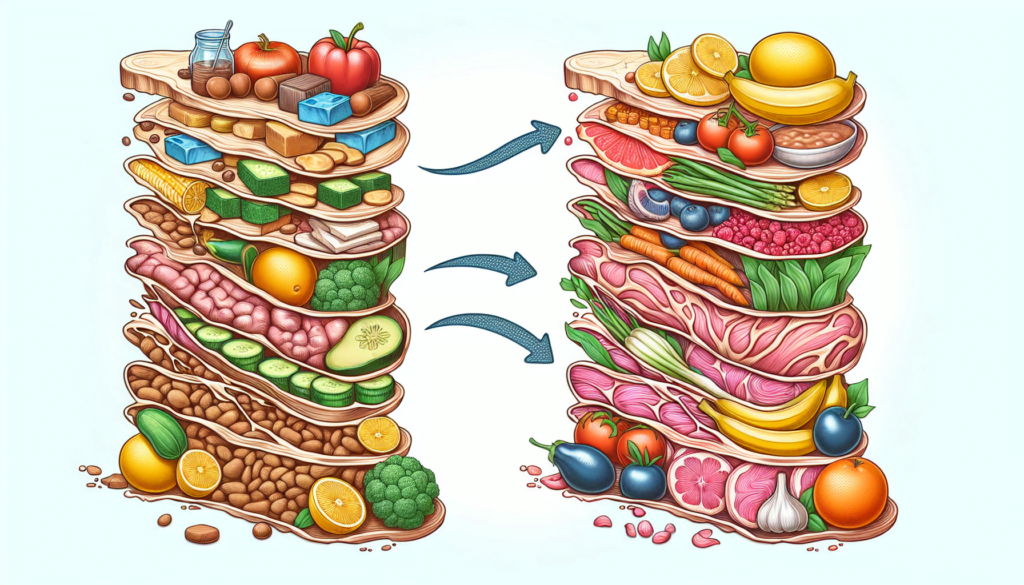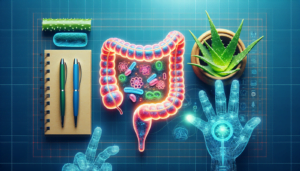Hey there! Let’s talk about something that might not be on your radar — the foods that can contribute to sagging skin. We all want our skin to stay firm and youthful for as long as possible, right? Well, it turns out that what you eat plays a big role in the health and appearance of your skin. So, buckle up and get ready to discover which foods might be secretly causing your skin to sag. Don’t worry, though, I’ve got some good news too — there are also foods that can help combat sagging skin. Let’s dive in and find out more!

Excessive Sugar Intake
Effects of Sugar on Skin
When it comes to maintaining healthy skin, excessive sugar intake can be a major culprit. Consuming too much sugar can lead to a variety of negative effects on the skin, including the acceleration of aging processes. High sugar diets have been shown to contribute to glycation, a process where excess sugar molecules bind to collagen and elastin fibers in the skin. This can result in the formation of advanced glycation end products (AGEs) which can weaken the skin’s structure and elasticity, leading to sagging skin and the appearance of fine lines and wrinkles.
High-Glycemic Foods
High-glycemic foods are those that cause a rapid spike in blood sugar levels due to their high carbohydrate content. When you consume these foods, your body quickly breaks down the carbohydrates into sugar, leading to a surge in blood sugar levels. This spike in blood sugar triggers a release of insulin, a hormone that helps regulate blood sugar. However, frequent spikes in blood sugar and insulin levels can promote inflammation in the body, including the skin. Inflammation can damage collagen and elastin fibers, contributing to sagging skin.
Added Sugars
Added sugars, such as those found in sugary beverages, candy, pastries, and processed snacks, are a major contributor to excessive sugar intake. These sugars provide no nutritional value and are quickly digested and absorbed by the body, leading to rapid spikes in blood sugar levels. Regular consumption of added sugars can also contribute to weight gain, as they are high in calories but low in beneficial nutrients. It’s important to be mindful of the amount of added sugars in your diet and opt for healthier alternatives whenever possible, such as fresh fruits or natural sweeteners like honey or maple syrup.
Artificial Sweeteners
While artificial sweeteners may seem like a better alternative to sugar, they can still have negative effects on the skin. Some studies suggest that artificial sweeteners can disrupt the balance of beneficial bacteria in the gut, which can in turn affect the skin’s health. Additionally, artificial sweeteners can still cause an insulin response in the body, leading to potential inflammation and collagen damage. It’s important to be cautious with your consumption of artificial sweeteners and opt for moderation or natural sweeteners instead.
Unhealthy Fats and Oils
Trans Fats
Trans fats, often found in processed and fried foods, are well-known for their negative impact on overall health. When it comes to the skin, trans fats can also contribute to sagging and unhealthy skin. These fats are artificially created through a hydrogenation process, which changes their chemical structure and makes them harder for the body to break down. This can lead to increased inflammation in the body, including the skin, and can disrupt the skin’s natural healing processes. Avoiding foods high in trans fats, such as fried foods and commercially baked goods, can help maintain healthier skin.
Saturated Fats
Saturated fats, commonly found in animal products like fatty cuts of meat and full-fat dairy, can also have detrimental effects on the skin. Consuming too much saturated fat can increase inflammation in the body, leading to skincare concerns like acne and dull complexion. It’s important to practice moderation when consuming saturated fats and opt for leaner protein sources and low-fat dairy options whenever possible.
Vegetable Oils
While vegetable oils may be commonly used in cooking and food preparation, they may not be the healthiest option for your skin. Vegetable oils, such as soybean oil and canola oil, are often refined and highly processed, which can strip them of their beneficial nutrients. Additionally, these oils are high in omega-6 fatty acids, which, when consumed in excess, can promote inflammation in the body. Opting for healthier alternatives like olive oil or avocado oil can provide your skin with essential fatty acids and antioxidants.
Processed and Fried Foods
Processed and fried foods are not only high in unhealthy fats and oils, but they also often contain added sugars and preservatives. These foods are typically low in beneficial nutrients and high in calories, which can contribute to weight gain and inflammation in the body. Inflammation can damage collagen and elastin fibers in the skin, leading to sagging and premature aging. Choosing whole, unprocessed foods and opting for healthier cooking methods like baking or grilling can help support healthier skin.
Alcohol Consumption
Dehydration
One of the most well-known effects of alcohol consumption is dehydration. Alcohol is a diuretic, meaning it increases urine production and can lead to excessive water loss in the body. Dehydration can have a direct impact on the health and appearance of your skin, as it can lead to dryness, dullness, and the appearance of fine lines and wrinkles. It’s important to stay hydrated and balance alcohol consumption with adequate water intake to help keep your skin hydrated and healthy.
Inflammation
Alcohol can also contribute to inflammation in the body, including the skin. Excessive alcohol consumption can trigger inflammatory responses in the body, leading to redness, puffiness, and irritation of the skin. Chronic inflammation can also disrupt the skin’s natural healing processes and contribute to the breakdown of collagen and elastin fibers, leading to sagging and premature aging. Moderation is key when it comes to alcohol consumption to minimize its inflammatory effects on the skin.
Loss of Nutrients
Alcohol can deplete the body of essential nutrients, including vitamins and minerals that are important for skin health. Nutrient deficiencies can compromise the skin’s ability to repair and regenerate, and can contribute to a dull complexion and weakened skin structure. It’s important to support your skin’s health by consuming a balanced diet rich in fruits, vegetables, and whole foods, and to be mindful of alcohol consumption to avoid nutrient depletion.
Impaired Collagen Production
Collagen is a protein that is crucial for maintaining the structure and elasticity of the skin. Excessive alcohol consumption can interfere with the body’s ability to produce collagen, leading to weakened skin structure and the appearance of sagging and wrinkles. Additionally, alcohol can inhibit the body’s absorption of key nutrients like vitamin C, which is essential for collagen synthesis. Limiting alcohol intake and supporting collagen production through a balanced diet and skincare routine can help maintain firmer, more youthful-looking skin.

High Sodium Foods
Water Retention
High sodium foods can contribute to water retention in the body, leading to bloating and puffiness, including in the skin. Excess sodium can disrupt the balance of fluids in the body, causing the skin to retain water and appear swollen. This can also make the skin feel tight and contribute to discomfort. Reducing your intake of high sodium foods, such as processed snacks, canned soups, and fast food, can help relieve water retention and promote healthier, less puffy skin.
Inflammation
Consuming high amounts of sodium can also contribute to inflammation in the body, including the skin. Inflammation can damage collagen and elastin fibers, leading to sagging and accelerated aging. By reducing your intake of high sodium foods, you can help minimize inflammation and promote healthier, more supple skin.
Impaired Circulation
High sodium diets can also have negative effects on circulation, which can impact the health and appearance of your skin. Excessive sodium intake can cause blood vessels to constrict and increase blood pressure, limiting blood flow to the skin. Reduced blood flow can deprive the skin of essential nutrients and oxygen, leading to a dull complexion and compromised skin health. Opting for low-sodium alternatives and incorporating foods rich in antioxidants and vitamins can support healthy circulation and vibrant skin.
Loss of Skin Elasticity
Sodium can also directly impact the elasticity of your skin. High levels of sodium can interfere with the body’s ability to maintain proper fluid balance, leading to decreased skin elasticity. As a result, the skin may feel less firm and appear saggy or loose. By reducing your sodium intake and consuming a diet rich in hydrating foods, you can help maintain your skin’s elasticity and promote a more youthful appearance.
Excessive Caffeine Intake
Dehydration
Caffeine, commonly found in coffee, tea, energy drinks, and some sodas, is a natural diuretic that can contribute to dehydration. Like alcohol, excessive caffeine consumption can increase urine production and cause water loss in the body. Dehydration can have a direct impact on the health and appearance of your skin, leading to dryness, dullness, and the formation of fine lines and wrinkles. It’s important to balance your caffeine intake with plenty of water to help keep your skin hydrated and healthy.
Accelerated Aging
Excessive caffeine intake can also accelerate the aging process of the skin. Caffeine stimulates the production of cortisol, a stress hormone that can contribute to inflammation and collagen breakdown. Chronic inflammation can damage collagen and elastin fibers, leading to sagging and wrinkles. Additionally, caffeine can interfere with restful sleep, which is crucial for the skin’s natural repair and regeneration processes. Limiting your caffeine intake and prioritizing quality sleep can help support healthier, more youthful-looking skin.
Reduced Collagen Production
Collagen is a key protein that provides structure and elasticity to the skin. Excessive caffeine consumption can interfere with collagen production and contribute to the loss of skin firmness and elasticity. Additionally, caffeine can inhibit the absorption of certain essential nutrients, such as vitamin C, which is crucial for collagen synthesis. Reducing caffeine intake and incorporating foods rich in collagen-boosting nutrients can help support collagen production and maintain more youthful-looking skin.
Increased Cell Damage
Caffeine has been shown to have antioxidant properties when applied topically to the skin, but excessive caffeine consumption can actually lead to increased cell damage. This is because caffeine can have a stimulating effect on the nervous system, which in turn can promote the production of free radicals. Free radicals are unstable molecules that can damage cells and contribute to premature aging. Moderation is key when it comes to caffeine consumption to reap its potential skin benefits without the risk of increased cell damage.
Processed and Refined Foods
Empty Calories
Processed and refined foods are often high in calories but low in essential nutrients. These foods are typically stripped of beneficial fiber, vitamins, and minerals during the refining process, leaving behind “empty calories.” Consuming too many empty calories can contribute to weight gain, inflammation, and a variety of health issues, including skin concerns like acne and dullness. Opting for whole, unprocessed foods can provide your skin with the nutrients it needs to maintain a healthy and vibrant appearance.
High Glycemic Index
Many processed and refined foods have a high glycemic index, meaning they cause a rapid spike in blood sugar levels when consumed. This spike in blood sugar triggers a release of insulin, which can promote inflammation in the body, including the skin. Inflammation can damage collagen and elastin fibers, leading to sagging and accelerated aging. By choosing foods with a lower glycemic index, such as whole grains, legumes, and fruits, you can help maintain more stable blood sugar levels and support healthier skin.
Lack of Nutrients
Processed and refined foods often lack the essential nutrients that are important for maintaining healthy skin. These foods are typically stripped of beneficial vitamins, minerals, and antioxidants during processing, leaving behind minimal nutritional value. Consuming a diet high in processed and refined foods can contribute to nutrient deficiencies, which can compromise the skin’s ability to repair and regenerate. It’s important to prioritize whole, nutrient-dense foods to provide your skin with the necessary building blocks for optimal health.
Increased Inflammation
Many processed and refined foods contain artificial additives, preservatives, and unhealthy fats, all of which can contribute to inflammation in the body. Inflammation can damage the skin’s structure and contribute to a variety of skin concerns, including acne, redness, and premature aging. By minimizing your consumption of processed and refined foods and opting for whole, natural options, you can help reduce inflammation and support healthier skin.
Highly Processed Meats
Nitrates and Nitrites
Highly processed meats, such as deli meats, sausages, and hot dogs, often contain nitrates and nitrites. These compounds are added to processed meats to enhance their flavor and color and to extend their shelf life. However, nitrates and nitrites can have detrimental effects on the skin. When consumed, these compounds can convert into harmful substances called nitrosamines, which have been linked to an increased risk of cancer and skin damage. Opting for unprocessed, leaner cuts of meat and minimizing your consumption of processed meats can help support healthier skin.
Sodium Content
Processed meats are often high in sodium, which as mentioned earlier, can contribute to water retention and inflammation in the body and skin. Excess sodium can disrupt fluid balance and lead to puffiness and bloating in the skin. Consuming high amounts of sodium can also raise blood pressure and impair circulation, which can impact the health and appearance of your skin. Choosing fresh, lean meats and seasoning them with herbs and spices instead of processed alternatives can help reduce your sodium intake and support healthier skin.
Advanced Glycation End Products
Highly processed meats are also sources of advanced glycation end products (AGEs). AGEs are compounds that form when sugars react with proteins or fats during high-temperature cooking processes, such as grilling or frying. Consuming foods high in AGEs can contribute to glycation in the body, a process where excess sugar molecules bind to collagen and elastin fibers in the skin. This can lead to the formation of AGEs, which can weaken the skin’s structure and elasticity, contributing to sagging skin and the appearance of fine lines and wrinkles.
Inflammatory Response
Processed meats are often high in unhealthy fats, preservatives, and additives that can trigger an inflammatory response in the body. Inflammation can damage collagen and elastin fibers in the skin, leading to sagging and premature aging. Additionally, processed meats may also contain high levels of omega-6 fatty acids, which, when consumed in excess, can promote inflammation. Opting for leaner, unprocessed meat options and incorporating more plant-based protein sources can help reduce inflammation and support healthier skin.
Canned and Packaged Foods
Preservatives
Canned and packaged foods often contain preservatives to extend their shelf life and prevent spoilage. These preservatives can have negative effects on the skin and overall health. Some preservatives, such as sulfites and benzoates, have been linked to skin allergies and sensitivities. It’s important to read food labels and opt for fresh or minimally processed alternatives whenever possible to minimize your exposure to potentially harmful preservatives.
Artificial Additives
In addition to preservatives, canned and packaged foods may also contain artificial additives, such as artificial colors, flavors, and sweeteners. These additives can have negative effects on the skin and overall health. Some artificial colors and flavors have been associated with skin allergies and sensitivities, while artificial sweeteners can disrupt the balance of beneficial bacteria in the gut, which can contribute to skin issues. Choosing whole, unprocessed foods can help reduce your intake of artificial additives and support healthier skin.
High Salt Content
Canned and packaged foods are often high in salt to enhance their flavor and preserve their shelf life. As mentioned earlier, excess sodium intake can contribute to water retention, inflammation, and impaired circulation, all of which can impact the health and appearance of your skin. Opting for low-sodium alternatives or preparing meals using fresh ingredients can help reduce your sodium intake and promote healthier skin.
Increased Free Radicals
Canned and packaged foods that have undergone high-temperature processing methods, such as canning or sterilization, can contain higher levels of free radicals. Free radicals are unstable molecules that can damage cells and contribute to premature aging. Consuming foods high in free radicals can increase oxidative stress in the body, which can accelerate the aging process. Choosing fresh, whole foods and preparing meals from scratch can help minimize your exposure to free radicals and support healthier, more youthful-looking skin.
Excessive Alcohol
Dehydration
Excessive alcohol consumption can have a dehydrating effect on the body, including the skin. Alcohol is a diuretic, meaning it increases urine production and can lead to excessive water loss. Dehydration can make the skin appear dry, dull, and prone to the formation of fine lines and wrinkles. It’s important to drink alcohol in moderation and balance it with plenty of water to help keep your skin hydrated and healthy.
Skin Inflammation
Alcohol can also contribute to inflammation in the body, including the skin. Excessive alcohol consumption can trigger inflammatory responses and can cause redness, puffiness, and irritation of the skin. Chronic inflammation can also disrupt the skin’s natural healing processes and contribute to the breakdown of collagen and elastin fibers, leading to sagging and premature aging. Moderation is key when it comes to alcohol consumption to minimize its inflammatory effects on the skin.
Weakened Collagen
Collagen is a protein that is crucial for maintaining the structure and elasticity of the skin. Excessive alcohol consumption can interfere with the body’s ability to produce collagen, leading to weakened skin structure and the appearance of sagging and wrinkles. Additionally, alcohol can inhibit the body’s absorption of key nutrients like vitamin C, which is essential for collagen synthesis. Limiting alcohol intake and supporting collagen production through a balanced diet and skincare routine can help maintain firmer, more youthful-looking skin.
Accelerated Aging
Excessive alcohol consumption can accelerate the aging process of the skin. Alcohol can stimulate the production of cortisol, a stress hormone that can contribute to inflammation and collagen breakdown. Chronic inflammation can damage collagen and elastin fibers, leading to sagging and wrinkles. Additionally, alcohol can impair restful sleep, which is crucial for the skin’s natural repair and regeneration processes. By drinking alcohol in moderation and prioritizing quality sleep, you can help support healthier, more youthful-looking skin.
High-Glycemic Carbohydrates
Blood Sugar Spikes
High-glycemic carbohydrates are those that cause a rapid spike in blood sugar levels due to their high carbohydrate content. Consuming these carbohydrates leads to a surge in blood sugar, triggering the release of insulin to regulate blood sugar levels. Frequent spikes in blood sugar can promote inflammation in the body, including the skin. Inflammation can damage collagen and elastin fibers, contributing to sagging skin and the appearance of wrinkles. Opting for lower glycemic alternatives like whole grains, legumes, and vegetables can help maintain more stable blood sugar levels and support healthier skin.
Increased Insulin Levels
High-glycemic carbohydrates also lead to increased insulin levels in the body. Insulin helps regulate blood sugar, but frequent and excessive insulin release can promote inflammation and trigger an androgenic response, which can contribute to skin concerns like acne. By choosing lower glycemic alternatives, you can help stabilize insulin levels and support healthier skin.
Inflammation and Glycation
Consuming high-glycemic carbohydrates can lead to inflammation in the body, including the skin. Inflammation can damage collagen and elastin fibers and contribute to sagging and premature aging. Additionally, high blood sugar levels can contribute to glycation, a process where excess sugar molecules bind to collagen and elastin fibers in the skin. This can lead to the formation of advanced glycation end products (AGEs), which can weaken the skin’s structure and contribute to sagging skin. Opting for lower glycemic alternatives can help minimize inflammation and glycation and support healthier, more youthful-looking skin.
Collagen and Elastin Damage
High-glycemic carbohydrates can also contribute to collagen and elastin damage. Elevated blood sugar levels can promote the production of molecules called matrix metalloproteinases (MMPs), which can break down collagen and elastin fibers in the skin. This can lead to weakened skin structure and the appearance of sagging and wrinkles. Choosing lower glycemic alternatives and incorporating collagen-boosting nutrients into your diet can help support collagen and elastin production, promoting firmer, more resilient skin.
In conclusion, maintaining healthy skin involves more than just using the right skincare products. The foods we consume can have a significant impact on the health and appearance of our skin. Excessive sugar intake, unhealthy fats and oils, alcohol consumption, high sodium foods, excessive caffeine intake, processed and refined foods, highly processed meats, canned and packaged foods, excessive alcohol, and high-glycemic carbohydrates can all contribute to sagging skin and other negative skin conditions. By being mindful of our dietary choices and opting for whole, nutrient-dense foods, we can support healthier and more vibrant skin. Remember, what you put into your body is just as important as what you put on your skin!


